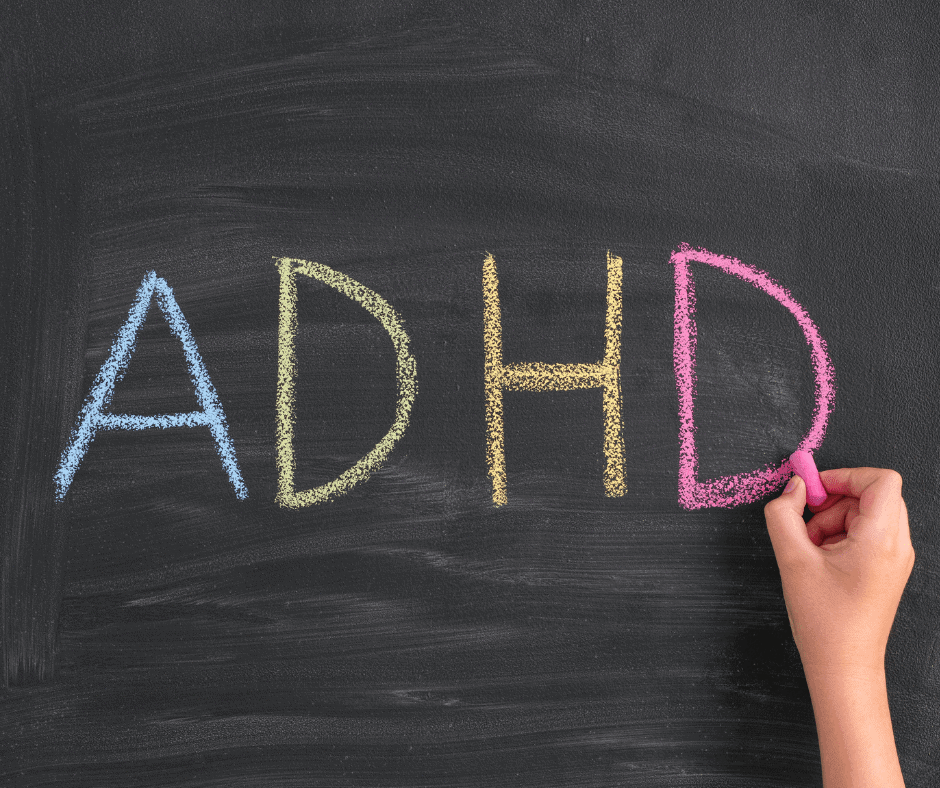ADHD and Neurodivergence
Do you ever feel that your brain operates differently from others around you? That you perceive, interact, and engage with the world in a fundamentally unique way? If you have Attention-Deficit Hyperactivity Disorder, or ADHD, these feelings might be familiar. ADHD is a neurodevelopmental disorder that affects brain development, structure, and function, making your cognitive processes distinct. The adoption of the term ‘ADHD neurodivergent’ helps us understand the diversity in human thinking and behavior.
ADHD is characterized by diverse symptoms that closely tie to the distinct wiring of the ADHD brain. This unique wiring plays out in aspects such as focus, attention, memory and learning. However, being ADHD neurodivergent doesn’t limit your potential for success or diminish your worth. At ‘Resilient Mind Counseling‘, we embrace and support neurodiversity, and believe that every mind has its strengths to be celebrated.
The term ‘neurodivergence’ was born from the concept of neurodiversity, acknowledging the vast differences in brain function and behaviors among humans. Being neurodivergent means that your brain functions differently from what’s considered the norm. But that doesn’t mean it’s wrong or problematic.
A quick summary of key points to understand about ADHD neurodivergence includes:
- It is a form of neurodevelopmental disorder.
- The brain of someone with ADHD is wired differently, impacting focus, attention, memory, and learning.
- Neurodivergent people can range from having mild signs that are barely noticeable to severe symptoms that greatly impact daily life.
- Despite the challenges, it’s possible, with the right support, to manage the symptoms and live a fulfilling life.
- Certain neurodivergent traits can be harnessed as strengths, like the ability to hyperfocus on tasks of interest.

Now, let’s delve deeper to better understand ADHD and neurodivergence, and explore the science behind the ADHD brain, the strengths and challenges of being neurodivergent, and how society – from workplaces to schools – can better embrace neurodiversity.
Understanding the ADHD Brain
One of the key aspects of understanding ADHD as a neurodivergent condition lies in understanding the unique structure and chemistry of the ADHD brain.
Unique Structure and Chemistry of the ADHD Brain
The brain of a person with ADHD is wired differently. This neurodevelopmental difference affects brain development, structure, and function, leading to variations in how individuals with ADHD process information and perceive the world around them . This unique wiring is not a deficiency or abnormality – rather, it’s a testament to the vast diversity of human thinking and behavior.
How ADHD Alters Perception of Reward and Gratification
Research indicates that the brain chemistry of individuals with ADHD often shows a lack of dopamine, a neurotransmitter that plays a significant role in reward and gratification. This dopamine deficit can alter how a person perceives reward, making it harder for them to stay motivated to complete tasks, especially those that may seem boring or repetitive 2.
Traits Displayed by Individuals with ADHD
Being ADHD neurodivergent can manifest in various ways. For instance, individuals may get hyperfixated on an object or topic of interest, experience sensory overload and overstimulation, struggle with organization and forgetfulness, and have difficulty concentrating. However, these traits, while sometimes challenging, are merely different ways of interacting with and responding to the world – they are not inherently problematic or wrong.
At Resilient Mind Counseling, we understand that this neurodivergence can present unique challenges, but we also believe that it’s crucial to celebrate the strengths and positive traits that come with being ADHD neurodivergent. We are here to help individuals understand their unique brain wiring, navigate their symptoms, and unlock their potential.
In the next section, we will further explore the strengths and challenges of ADHD neurodivergence, shedding light on both the obstacles and the opportunities that come with this unique way of thinking and processing information.
The Strengths and Challenges of ADHD Neurodivergence
ADHD neurodivergence brings both strengths and challenges. It’s vital to understand this balance to fully grasp the neurodivergent experience and provide appropriate support.
Celebrating the Positive Traits of ADHD Neurodivergence
In our work at Resilient Mind Counseling, we’ve seen firsthand that the unique wiring of the ADHD brain can lead to distinct strengths. For example, individuals with ADHD are often highly spontaneous, creative, and can think outside the box. They also tend to have higher energy levels and can be extraordinarily focused when engaged in tasks or subjects they find interesting.
Take, for example, the ability to hyperfocus, a common trait in people with ADHD. This ability allows them to concentrate on a task intensely, often leading to high-quality work and innovative solutions.
Moreover, people with ADHD often exhibit high levels of empathy and can approach problems with courage and spontaneity. These traits can be significant assets in various settings, from the classroom to the workplace and beyond.
Understanding the Challenges Faced by Individuals with ADHD
While the strengths of ADHD neurodivergence are worth celebrating, it’s also important to acknowledge the challenges. ADHD can affect focus, attention, memory, and learning, leading to issues such as inattention, impulsivity, and emotional dysregulation.
Inattention can manifest as difficulty sustaining focus, being easily distracted, and having trouble organizing and prioritizing tasks. Impulsivity can lead to hasty decision-making and difficulty controlling reactions. Emotional dysregulation can result in intense emotional responses and mood swings that may be challenging to manage.
These symptoms can affect various aspects of life, from school and work performance to relationships and social interactions. But with appropriate strategies and supports, these challenges can be effectively managed.
How ADHD Does Not Limit What Individuals Can Accomplish
Despite these challenges, ADHD does not limit what individuals can accomplish. In fact, neurodivergent individuals often thrive when they are in environments that understand and accommodate their unique ways of thinking and learning.
At Resilient Mind Counseling, we believe in nurturing the positive traits of ADHD neurodivergence. We provide tailored strategies to help individuals manage their symptoms and harness their strengths to reach their full potential.
Understanding ADHD neurodivergence is about recognizing the whole picture – the strengths, the challenges, and the potential. And most importantly, it’s about celebrating the diversity of human thinking and behavior, and embracing the unique contributions that every individual can bring to our world.
Neurodiversity in the Workplace and Education
In our society, many systems such as education, employment, and health services are built with the assumption of neurotypicality. However, this assumption can lead to the exclusion of individuals with neurodevelopmental differences like those who are ADHD neurodivergent. The importance of accommodating and supporting these individuals cannot be overstated.
The Importance of Accommodating and Supporting Neurodivergent Individuals
At Resilient Mind Counseling, we believe that neurodiversity is a strength that should be recognized and celebrated. Neurodivergent individuals, including those with ADHD, bring unique perspectives and abilities that can greatly contribute to the workplace and education settings. Accommodating and supporting these individuals not only fosters inclusivity, but also improves overall productivity and creativity in diverse environments.
Challenges Faced by Neurodivergent Individuals in the Workplace
Despite the strengths they bring, neurodivergent individuals often face significant challenges in the workplace. These challenges often stem from a lack of awareness and understanding, stigma, and a lack of appropriate infrastructure. For individuals who are ADHD neurodivergent, this might take the form of difficulty staying focused on tasks that do not interest them, being easily overstimulated, or struggling with organization and forgetfulness.
How Employers Can Embrace Neurodiversity
Embracing neurodiversity in the workplace involves creating an environment that is conducive to the needs of all employees, including those who are neurodivergent. Here are a few approaches that employers can take to make their workplaces more neurodiversity-friendly:
Accommodate sensory needs: Small adjustments can make a big difference. For individuals who are sound sensitive, consider offering a quiet break space, communicate expected loud noises, or offer noise-cancelling headphones. Allow modifications to the usual work uniform for tactile sensitivities, and consider allowing the use of fidget toys or extra movement breaks for those who need them.
Use a clear communication style: Avoid sarcasm, euphemisms, and implied messages. Provide concise verbal and written instructions for tasks, and break tasks down into small steps. Ensure to give advance notice if plans change and provide a reason for the change.
Don’t make assumptions: Each person is unique. Always ask about an individual’s preferences, needs, and goals.
Promote awareness and understanding: Offer workplace training sessions to raise awareness about ADHD and other neurodivergent conditions. This can foster a more accepting and supportive work environment.
By embracing neurodiversity, employers can foster an inclusive workplace where all individuals are valued for their unique strengths and talents. At Resilient Mind Counseling, we support individuals in navigating their neurodivergence and reaching their full potential. We advocate for a more inclusive and accepting society, where neurodiversity is recognized, understood, and celebrated.
Other Neurodivergent Conditions
Beyond ADHD, there are several other conditions that fall under the umbrella of neurodivergence. Each of these conditions is distinct, yet they all share a common trait: they involve a divergence from what’s considered “typical” or “normal” in terms of brain function. Understanding these conditions can help us appreciate the vast diversity of human experiences and abilities.
Autism Spectrum Disorder
Autism Spectrum Disorder (ASD) is a neurodevelopmental condition characterized by difficulties with social interaction and communication, as well as repetitive behaviors and restricted interests. Like ADHD, ASD is a lifelong condition that affects how individuals perceive and interact with the world. However, the manifestation and severity of the symptoms can be highly varied, hence the term “spectrum” (source: ADHD Aware).
Dysgraphia, Dyslexia, and Dyscalculia
These are learning disorders that can deeply affect a person’s academic and everyday life. Dysgraphia impacts a person’s writing abilities, making it challenging to write legibly or coherently. Dyslexia affects reading and related language-based processing skills. Dyscalculia, on the other hand, hinders a person’s ability to understand and manipulate numbers and mathematical concepts.
Tourette Syndrome, Down Syndrome, and Epilepsy
Tourette Syndrome is characterized by multiple motor tics and at least one vocal tic. Down Syndrome is a genetic disorder that affects physical growth and intellectual ability. Epilepsy is a neurological condition that causes recurring seizures. While these conditions may present unique challenges, individuals with these diagnoses can also display incredible strengths and abilities.
Obsessive-Compulsive Disorder, Schizophrenia, Bipolar Disorder, Borderline Personality Disorder, Anxiety, and Depression
These conditions are often perceived as mental health issues, but they are also considered part of neurodivergence. They can significantly impact thought processes, emotional regulation, and behavior. However, with the right support and treatment, individuals with these conditions can lead fulfilling lives.
At Resilient Mind Counseling, we understand that being diagnosed with a neurodivergent condition can be overwhelming. We are here to provide you with the necessary support and guidance, and to help you leverage your unique strengths and abilities. Whether you’re dealing with ADHD, ASD, or any other neurodivergent condition, we invite you to explore our neurodivergent therapy services to find the support and understanding you need.
Resources and Support for Individuals with ADHD
Navigating life as an individual with ADHD can be challenging, but there are numerous resources and support available. Let’s explore some of these.
Importance of Consulting with Healthcare Providers
One of the first steps in managing ADHD is consulting with healthcare providers to understand your condition better and explore the available treatment options. They can provide tailored strategies and interventions based on your unique needs and circumstances. Every individual is unique, and what works for one person may not work for another.
Online Spaces for Neurodivergent Individuals
The internet provides a vast array of resources and online spaces where neurodivergent individuals can gather, share experiences, offer advice, and provide support to each other. These communities can be found on popular social media platforms and various websites. These online spaces can provide a sense of belonging and understanding that may be challenging to find elsewhere.
How Resilient Mind Counseling Supports Neurodivergent Individuals
At Resilient Mind Counseling, we recognize the unique strengths and challenges that come with being ADHD neurodivergent. We provide a safe, understanding, and supportive environment where you can explore your neurodivergence and learn strategies to thrive.
Our approach is centered on a strength-based model, where we focus on enhancing your unique abilities and cognitive styles rather than trying to “fix” anything. We believe in the power of neurodiversity and celebrate the unique ways your brain works.
We offer a range of therapeutic interventions tailored to your needs, from individual therapy to ADHD behavioral therapy. We are dedicated to helping you navigate life with ADHD, leveraging your strengths to achieve a fulfilled and balanced life.
Being ADHD neurodivergent is not a limitation. It’s a different way of experiencing the world, and with the right support and resources, you can navigate life successfully and joyfully. If you’re ready to start your journey, reach out to us today.
Conclusion: Embracing Neurodiversity and ADHD Neurodivergence
Understanding and embracing ADHD as a part of neurodiversity is a crucial step towards appreciating the rich tapestry of human cognition. Rather than viewing ADHD as a disorder or a deficiency, we should see it as a different way of perceiving and interacting with the world. This shift in perspective is not just about being politically correct or sensitive. It’s about recognizing that every brain is unique and that these differences contribute to the richness and diversity of human thought and innovation.
Those who are ADHD neurodivergent may face unique challenges, but they also possess remarkable strengths. From the ability to hyperfocus on tasks of interest, to high energy levels, to creative and outside-the-box thinking, these traits can be channeled into incredible achievements with the right support and understanding.
The journey of embracing ADHD neurodivergence begins with education and understanding. It’s important to learn about the unique structure and chemistry of the ADHD brain, and how these differences can manifest in both challenges and strengths. This knowledge can help individuals, families, educators, and employers better support those who are neurodivergent.
At Resilient Mind Counseling, we believe in celebrating neurodiversity and providing support and resources for those who are neurodivergent. We are committed to fostering an environment where all individuals feel seen, understood, and valued.
We also recognize the importance of creating inclusive and supportive environments in workplaces and educational settings. By implementing accommodations and support for neurodivergent individuals, we can tap into a diverse talent pool and promote innovation.
Beyond ADHD, there are many other forms of neurodivergence, including Autism Spectrum Disorder, Dysgraphia, Dyslexia, Tourette Syndrome, and many more. Each one contributes to the beautiful diversity of human thought and experience.
Finally, we encourage you to leverage online spaces and communities where neurodivergent individuals can share experiences, exchange information, and offer support to each other. You are not alone in your journey.
In conclusion, being ADHD neurodivergent is not a limitation. It’s a different way of experiencing the world, and with the right support and resources, you can navigate life successfully and joyfully. Embrace your neurodivergence, celebrate your unique strengths, and remember: you are capable of achieving monumental milestones in life.
If you’re ready to start your journey, or if you’re looking for more resources and support, don’t hesitate to reach out to us. We’re here to support you every step of the way.
For more information about neurodivergence, check out our articles on Understanding Neurodivergent Couples Therapy and Exploring the Strengths of Autism.















